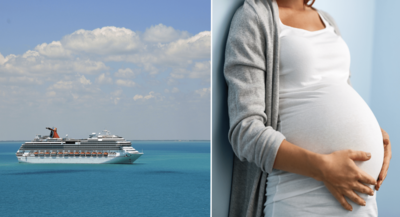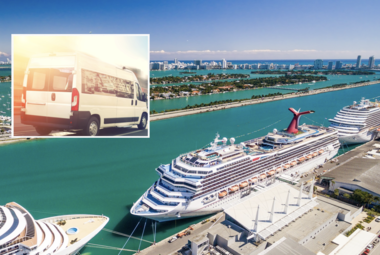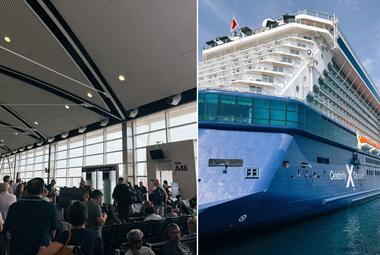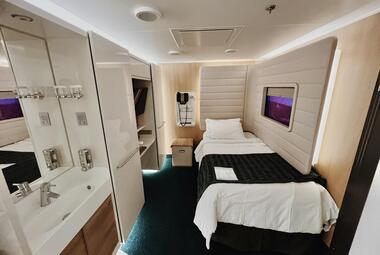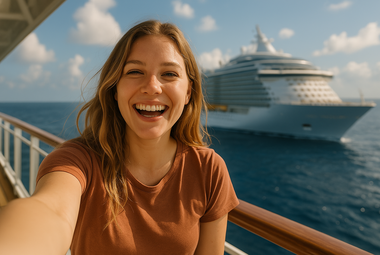Can you go on a cruise while pregnant? Let's say you booked a vacation a year away, just to find out along the way that you're expecting a little bundle of joy! What if you want to take a "babymoon" for one last vacation before becoming parents?
While taking a pre-baby trip sounds exciting since you'll be swapping cooking and cleaning for a relaxing Caribbean voyage with great food, relaxing ocean views, and quality entertainment, there are a few things that you should be aware of when it comes to taking a cruise while pregnant.
All of the mainstream cruise lines, including Royal Caribbean, Carnival, and Disney, have the same policy that states guests are only allowed to sail through their 23rd week of pregnancy. This means that if the cruise is scheduled to set sail after you have entered your 24th week, or you will enter your 24th week at any point during the cruise, you will be denied boarding.
Here's everything else you need to know about cruising while pregnant.
Why can't you take a cruise once you've reached the 24th week of pregnancy?
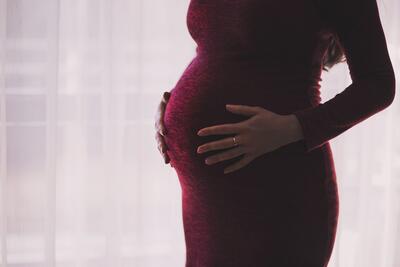
Imagine that you're on a cruise with multiple days at sea away from a major hospital. While all cruise ships have medical facilities onboard, they lack adequate prenatal or infant care facilities onboard.
Should onshore assistance be necessary, the availability and quality of healthcare options may differ significantly between various cruise destinations. Because of this, it is suggested to review all aspects of the proposed itinerary with a medical professional to highlight any issues and determine how best to manage them.
Cruise line-specific policies regarding taking a cruise while pregnant
Some cruise lines have stricter policies than simply stating no guest can board a ship once they've reached their 24th week.
Princess Cruises
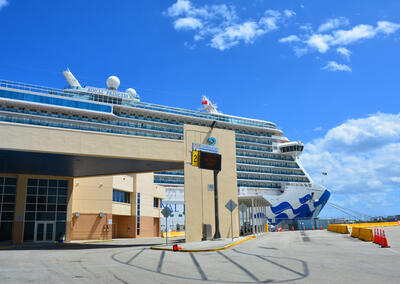
According to Princess' website, "All pregnant women are required to produce a physician’s letter stating that mother and baby are in good health, fit to travel and the pregnancy is not high risk."
The letter must also include the estimated date of delivery (EDD) calculated from both Last Menstrual Period (LMP) and ultrasound (if performed). Please ensure you have your doctor’s letter with you when you embark."
Norwegian Cruise Line
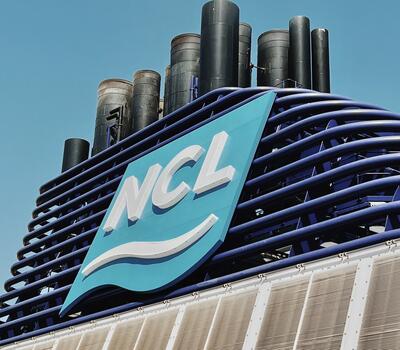
"Norwegian will make every effort to accommodate you, providing you have not entered the 24th week of pregnancy when the cruise ends. Please include your cruise details in an email to the Access Desk with a medical certificate establishing your due date prior to your cruise," reads Norwegian's website.
Royal Caribbean International

If you want to take a cruise onboard a Royal Caribbean ship while pregnant, you and your physician "...should consider before any cruise that there is no Obstetrician/Gynecologist available on the ship, and that pregnancies, when unstable and poorly controlled, are potentially life-threatening, especially without back up."
"A Guest may be at sea for several days without any immediate hospital and/or specialist back up, and that since the proposed itinerary is not within the U.S., and the availability of specialized shore side facilities can be problematic."
"All guests are required to fill out a Public Health Questionnaire prior to arrival or at the pier attesting that they are not more than 23 weeks pregnant. If you have already booked a cruise or cruise tour and do not meet this requirement, please contact your Travel Advisor or call us at (866) 562-7625 and request a Resolution Agent."
Celebrity Cruises
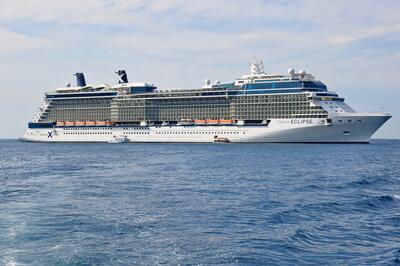
Since Royal Caribbean and Celebrity Cruises are both part of the Royal Caribbean Group, they have similar policies:
"All guests are required to sign a health questionnaire upon check-in to ensure they are aware of our pregnancy policy. If you have already booked a cruise or Cruisetour and do not meet this requirement, please contact your travel advisor or call us at 1-888-283-7275 and request a resolution agent."
Carnival Cruise Line
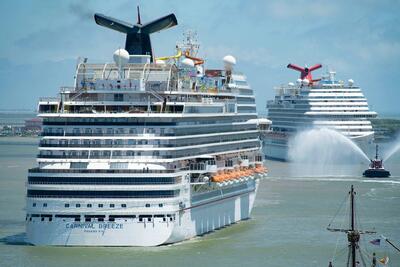
Carnival does not require any additional documentation. According to their website, "Due to limitations of medical care, both on board and in various ports of call, women who have entered or exceeded their 24th week of pregnancy, at any time during the cruise, will not be allowed to board or sail with the ship."
"...any pregnant woman who tries to board the vessel, who has or will enter her 24th week of estimated fetal gestational age at any time during the cruise, risks denial of boarding and/or disembarkation without compensation or refund."
Disney Cruise Line
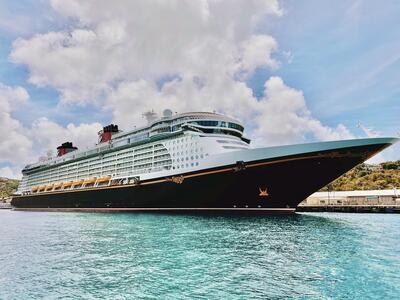
While you might not want to be surrounded by a bunch of children on your babymoon, you might want to experience the magic of Disney one last time before seeing it through your child's eyes!
If that's the case, note that Disney Cruise Line specifies that even if you have a doctor's note or waiver of liability, "Women who have entered their 24th week of pregnancy as of their embarkation date or who will enter their 24th week of pregnancy during the cruise will be refused passage due to safety concerns...Disney Cruise Line cannot be held responsible or liable for any complications relating to pregnancy at any stage."
Read more: The $135 dinner on Disney Cruise Line isn't cheap, but the fancy food sold me on it being worth it
Holland America Line
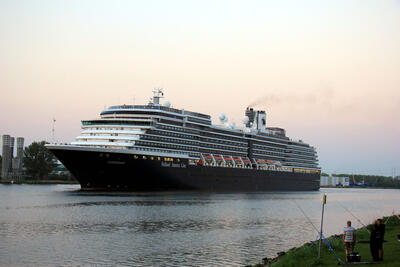
"If you are pregnant or sailing with a guest who is pregnant they must provide a physician’s letter stating the expected due date, medical fitness to travel and the pregnancy is not high risk," reads Holland America's website.
"Please also include your name, booking number, ship and sailing date. Please fax your letters to our Guest Accessibility Department at 800-577-1731. Or email them to [email protected]. We urge you to have the letter faxed in as soon after making your reservation as possible."
Virgin Voyages
Virgin Voyages is the only adults-only mainstream cruise line, so it makes sense that you might be considering it during your babymoon or why you booked the vacation ahead of time as a newlywed couple!
Per their website, "Congratulations on your new mini-Sailor! Although we're excited you've decided to book, you must be less than 24 weeks pregnant by the end of the sailing. Please make sure to bring all appropriate medical documentation to confirm this timing when you arrive."
How to deal with nausea and seasickness while on a cruise?

It has been estimated that nausea can affect up to 75% of pregnant mothers, which can be exacerbated by seasickness while cruising.
It’s a good idea to identify appropriate medications for morning sickness and ensure enough is brought onboard. There are a variety of suggested remedies for sea sickness including ginger ale, wristbands, and medications.
A local pharmacist can be valuable in determining what is needed. If you have any concerns about taking certain medications while pregnant, we suggest consulting your primary care physician.
Cruisers also have preferences and notions about the best location of cabins to alleviate motion issues. Cabins mid-ship and on the lower decks can help, but there are no guarantees. Predicting Itineraries or which ports will have choppy waters and high winds is not easy. Generally, the newer, larger ships are better equipped with stabilizers which greatly reduce motion.
Read more: How to avoid cruise motion sickness
What activities can you partake if you are cruising while pregnant?

It is helpful to review ship activities and shore excursions to determine what is suitable. Rock climbing, ATV adventures, waterslides, and bumper cars may not be appropriate, even at the early stages of pregnancy.
The cruise planner is a great source of information, providing details such as duration, required activity level, and what to bring for excursions. The climate and temperature are also important.
Climbing an ancient Mayan temple in the mid-day Mexican heat may be too much, while a long catamaran sail or a ferry ride may be problematic to those who are motion-sensitive.
It's good to be informed about planned ports. The American State Department provides a useful, up-to-date list of travel advisories and helpful information on safety and health by country. Information on foreign medical systems, payments, insurance, availability of prescription medications, and tourism risks are provided.
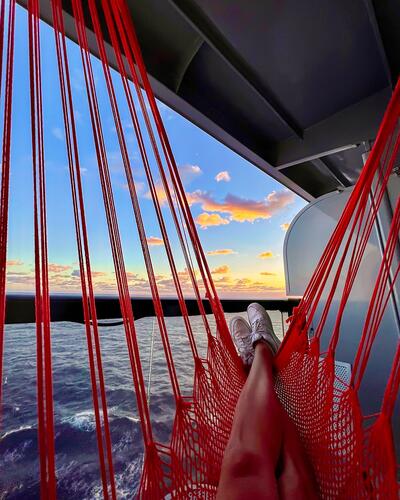
Virgin Voyages, in fact, encourages babymoons onboard their adult-only vessels! They claim that there's the perfect onboard activity for everyone. Those with sore feet can head to the Tune Up Mani-Pedi Spa for a Saving Grace Pedicure, while guests with intense cravings, whether it's pickles, ice cream, or the perfectly cooked piece of meat, can indulge in all-you-can-eat food.
Should I be worried about Zika or other viruses?

With previous outbreaks in the Americas, Zika is still a concern, especially for expecting parents. Zika is a virus that spreads primarily through mosquitos and can have an impact on a pregnant woman and child. Generally, symptoms are mild such as a rash, but more serious side effects have been reported.
The Centre for Disease Control and Prevention (CDC) has had a number of alerts related to Zika. The larger outbreak in the Americas has lessened but Zika is still a potential risk in many countries in the Americas, including the Caribbean.
Also, be aware of other viruses that spread via mosquitoes such as dengue and malaria. Currently, the CDC has listed an advisory for Jamaica as it relates to dengue. Bug repellent, long sleeves, and pants can be effective in preventing bites or guests may decide to stay onboard and enjoy the quiet of the ship.
As of July 2022, the CDC's COVID-19 Program for Cruise Ships is no longer in effect. If you have any concerns, weigh them with your primary care physician prior to booking.
The cruise port is not within driving distance. Can I fly?

Expecting travelers should be aware of any transportation issues related to their trip. Soon-to-be moms can usually fly later into pregnancy than cruise ships allow.
Most airlines cite 36 weeks as a cutoff; however, a ten-hour flight to Europe may not be ideal (or comfortable) for some.
If possible, try and book a cruise within driving distance. While most cruises to The Bahamas and Caribbean depart out of Florida, some cruise lines sail out of ports like Baltimore, Maryland; Norfolk, Virginia; Boston, Massachusetts; Galveston, Texas; and New York.
Read more: Why you should plan a cruise within driving distance
Travel insurance and passports

Travel insurance is always a good idea for vacations. What is covered while pregnant varies by provider, so review the terms and conditions carefully and ask a question if unclear.
For example, a normal pregnancy is not normally considered a valid reason for cancellation, while some can cover complications such as losses resulting from unforeseen pregnancy complications, such as pre-eclampsia or gestational diabetes.
Although many cruisers choose to travel with no passport on close-looped cruises, a passport may be a good idea. If delayed in port for sickness or a missed ship, it would be far easier to return home with a passport rather than to deal with the complexities of international travel without one.


